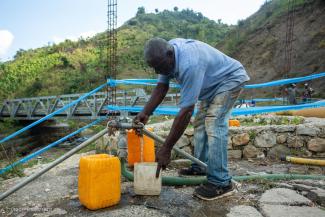Sanitation and Water for All (SWA) works with partners from six constituencies. While governments have primary responsibility for delivering on the Sustainable Development Goal 6, mobilizing resources and developing innovative solutions to leave no one behind; they are also required to concert effort with all stakeholders in the society, research and learning institutions included.
The Research and Learning Constituency represents academic or similar institutions, agencies or networks (for example universities, think-tanks, training centres etc) with recognized technical and policy expertise, that undertake or promote research and advance new learning in the water, sanitation and hygiene field.
All research and learning organizations are encouraged to join SWA partner networks or be connected to existing multi-stakeholder platforms at the national, regional or global level.
What is the role of Research and Learning within SWA?
The Research and Learning Constituency represents the voice of research and learning organizations and networks in the global WASH sector. Research and learning partners are important because they provide and strengthen the knowledge and evidence-base for the WASH sector. They are committed to making existing information in the sector relevant to SWA and available and accessible to other SWA partners. This helps to promote better evidence-based decision making within SWA and in the sector.
Research and learning partners also commit to documenting SWA experiences and events such as the High-level Meetings (HLM) and the Mutual Accountability Mechanism. These partners play a key role to encourage the sharing of lessons learned among SWA partners to support SWA goals. They also try to advocate for capacity development and funding for research and learning at the national level, making sure this area is included in national plans.
Examples of the Research and Learning partners' work in progress include:
- Putting an information package together on Aid Effectiveness in the WASH sector and how this relates to SWA, especially in relation to supporting country sector capacity.
- Making sector policy and planning documents more readily accessible through the design and implementation of a repository for sector policy and planning documents.
- Taking part in different working groups such as in the Country Processes Work Group, the SWA monitoring group and in ad hoc task teams such as for the preparation of the SWA Partnership Meetings.
·
How is the Research and Learning Constituency represented within SWA?
Two Research and Learning Representatives form part of the SWA Steering Committee, which is the SWA decision-making body.
At the national level, the Research and Learning constituency is supported by Research and Learning focal points (main and alternate), responsible for liaising with government, partners from other constituencies, and other entities from the research and learning constituency in the country, to deliver on the SWA strategic framework and objectives.
All Research and Learning focal points can be found on the dedicated country pages.
How can my organization get involved?
Please review the:
- list of existing SWA Research and Learning constituency partners below;
- member countries;
- SWA Strategic Framework 2020-2030; and
- SWA Governance Document.
If the work of your organization is aligned with the objectives and mission of SWA and is not yet a member, please fill in the application form to join the partnership.
As a SWA partner, you will be:
- part of a global movement to raise the profile of water, sanitation and hygiene;
- working with SWA to improve sustainable WASH service delivery;
- contributing to our joint efforts to increase and improve funding for this life-changing sector of development;
- helping SWA to realize the fundamental human rights to water and sanitation and leave no one behind.
How to engage with other SWA constituencies?
The SWA Strategic Framework is anchored and fosters cross-constituency cooperation and accountability. By joining SWA you will be able to assess and improve your engagement and advocacy efforts, globally, in the region, and in countries where you are active.
For any queries regarding further engagement with the SWA partnership, please contact the Secretariat.





